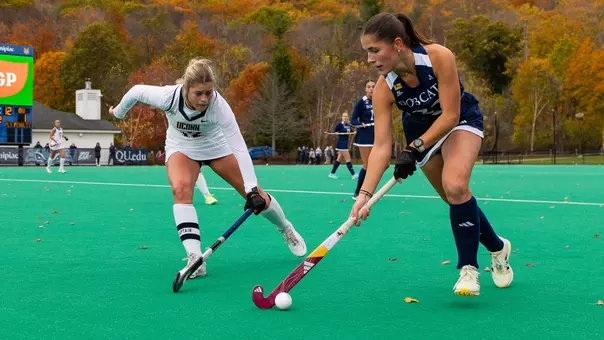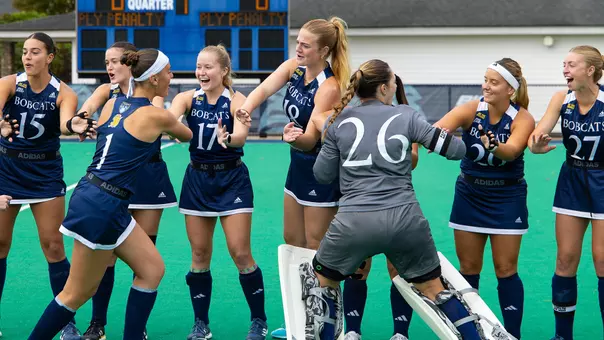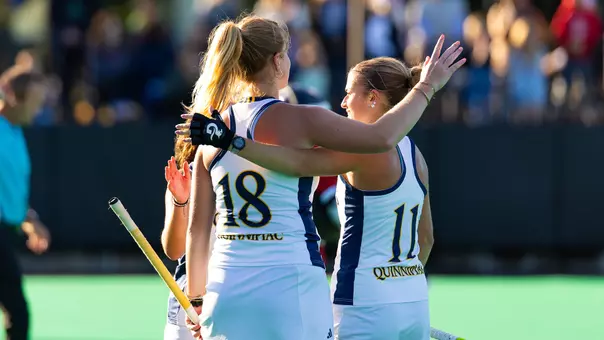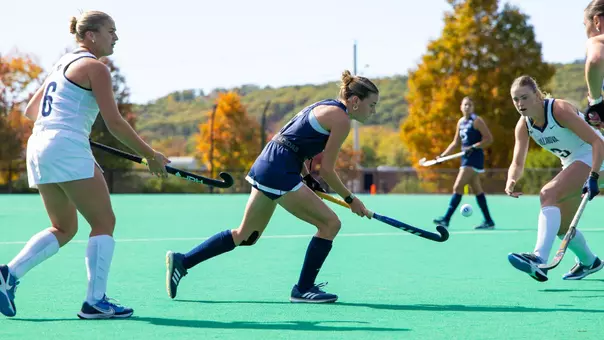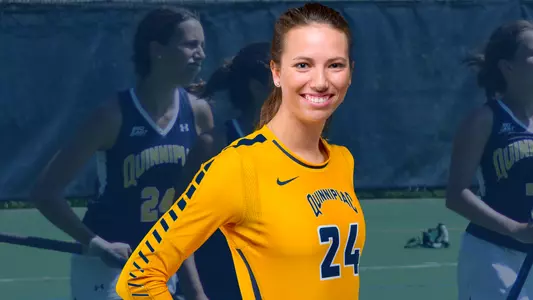
Down But Never Out: QU Field Hockey's Allison Tanner
9/2/2016 3:17:00 PM | Field Hockey
(By Tyler Brosious, Special to QuinnipiacBobcats.com)
The definition of perseverance, according to the Merriam Webster dictionary is: "continued effort to do or achieve something despite difficulties, failure, or opposition."
For Allison Tanner, who has come back from an emotionally and physically crippling disease to become a key part of the Bobcat's field hockey program, perseverance has defined her four years at Quinnipiac.
Tanner got her start in field hockey after two ankle surgeries in high school hindered her ability to succeed at the sport she grew up playing, soccer. After conversations with her family, including her two sisters, who also grew up playing the sport, she decided to start her field hockey career in her junior year of high school.
"It started out with a lot of individual practices, just trying to learn the sport" Said Tanner, "My club coach was the one who knew Becca [Main] and introduced me to the school."
Within no-time, Tanner knew that Quinnipiac was a place where she wanted to continue her new field hockey career and the feeling was mutual.
"Allison was a no brainer," said Quinnipiac field hockey head coach Becca Main, "Especially with her academics - she is brilliant. She was teachable and was really a low-risk, high-reward player."
Tanner arrived in Hamden, excited to start the newest chapter in her life and in her field hockey career.
That is when things took a turn for the worst.
In October of 2013, during Tanner's freshman season, she suffered bilateral tibia stress fractures in both of her shins, prohibiting her ability to walk and, ultimately, ending her season.
"I was in a wheelchair for about three weeks and I was on crutches for another two," said Tanner. "When we tried to get me back to walking and running… that is when things took a really bad turn for me."
Tanner was riddled with horrific symptoms including numbness and sharp pains and suddently the 2014 All-Academic team honoree started to struggle in school.
"My cognitive function and ability fell very below par," said Tanner "I was having issues focusing, sleeping. I was having really bad neurological symptoms…it was bad."
Tests and doctor appointments followed and they didn't stop coming.
"I had every single test possible ran on me," said Tanner
A slew of visits to the neurologist, as well as blood work and brain and spinal scans left Tanner a shell of herself. Then, right before an upcoming spinal tap, her cousin recommended to her mom that Allison test for Lyme Disease.
"We spent a year and a half watching her, not knowing what she had." Main said. "Not knowing is almost worse than being given a diagnosis. I remember her saying she would take anything at that point as long as they can tell her what it was."
After three weeks, the test results came back- Tanner finally knew what it was.
She was diagnosed with late-stage neurological Lyme Disease - along with a couple other tick-borne diseases in late July, just a month away from her sophomore season.
Then the real battle started. Tanner started out on heavy doses of oral antibiotics, which were doing more harm than good.
"The oral medicine is really hard on your gut, so I was getting sick a lot," said Tanner. "I was losing about twenty pounds a month. After two months, I realized it wasn't helping me - it was just making me sick."
At that point, Tanner decided she could not return to Quinnipiac for the beginning of her sophomore year as she would need a PICC Line in her arm to receive intravenous antibiotic therapy twice a day for another two months.
"I was really…," Allison started before pausing to remember. "…really, really sick."
For Tanner and her family, the lowest point of her recovery came on a night in September when she was woken by shooting pains in her chest.
"I thought I was having a heart attack," Tanner said.
She ran to wake up her parents and began to have fully body tremors, losing complete control of her motor skills and her body.
"It was like a seizure, but I was conscious," Tanner said. "We didn't know what to do."
Doctors told Tanner that the body tremors were toxic shock responses to the infection finally dying off in her body.
While Tanner was fighting the infection in her body, her teammates were fighting for a MAAC title, which she followed every step of the way.
"I was following the team any way I could," Tanner said."Texting people, watching the games online, going to as many games as my parents would allow. I loved hearing what was going on because I love to see my teammates succeed."
In early December of 2014, Tanner was notified that her test came back clean and that the Lyme Disease was gone and that she was almost back to normal.
"I made a plan," Tanner recounted regarding about her recovery. "I took it week-by-week, day-by-day, focusing on being as proactive as possible to be as healthy as possible as I could be."
Allison returned to the turf her spring semester of her sophomore year, just two months after being cleared of the disease that left her in excruciating, near-crippling pain.
After days of sometimes practicing in 30 seconds clips, which at times produced a major setback in the form of tremors that the doctors considered "aftershocks" from the Lyme Disease. Fast forward to the start of her senior year, and Tanner has become an extremely important player on the Bobcats' roster.
"Allison has shocked me, the fact that someone has the ability and the strength and the resiliency to handle pain like her," Main said "I have never had an athlete like her and there is not even a chance that I will meet someone like her who can handle the pain and the exhaustion that she did."
Tanner and the entire Bobcats' coaching staff have been extremely cautious in the way they have approached her playing time at practice and in games, but Tanner has shocked the people around her in what she has overcome and what she continues to do for this Bobcats team.
During a game against UMass Lowell on Aug. 5, Tanner entered the game with two minutes to play in the first half. She immediately made a strong defensive play on an opposing player, stole the ball and sprung the offense on an attack that knotted the game at two going into the break.
"It is a business to her." Main said, regarding Tanner's work on the field. "She never looks at it differently than: this is my job, this is what I am supposed to do."
Tanner, who has played the role of trainer, teacher, coach, and surrogate mother for her teammates gets to be just that this season - a teammate. As the Bobcats embark on their inaugural season in the BIG EAST Conference, Allison will be a crucial part of it all.
"Honestly, I am my least priority," Tanner said, while brandishing a humbling smile. "If I don't get out there and play...if I'm not what is best for the team, I don't mind. I have a leadership position on the team and will always be supportive. Whatever the team needs, I will do it."
The definition of perseverance, according to Quinnipiac field hockey, is Allison Tanner.
Tyler Brosious is a senior journalism major in Quinnipiac's School of Communication and the newest feature writer for QuinnipiacBobcats.com. For all the news, student-athlete features and updates on Quinnipiac Athletics, visit QuinnipiacBobcats.com or follow on Twitter @QUAthletics.
The definition of perseverance, according to the Merriam Webster dictionary is: "continued effort to do or achieve something despite difficulties, failure, or opposition."
For Allison Tanner, who has come back from an emotionally and physically crippling disease to become a key part of the Bobcat's field hockey program, perseverance has defined her four years at Quinnipiac.
Tanner got her start in field hockey after two ankle surgeries in high school hindered her ability to succeed at the sport she grew up playing, soccer. After conversations with her family, including her two sisters, who also grew up playing the sport, she decided to start her field hockey career in her junior year of high school.
"It started out with a lot of individual practices, just trying to learn the sport" Said Tanner, "My club coach was the one who knew Becca [Main] and introduced me to the school."
Within no-time, Tanner knew that Quinnipiac was a place where she wanted to continue her new field hockey career and the feeling was mutual.
"Allison was a no brainer," said Quinnipiac field hockey head coach Becca Main, "Especially with her academics - she is brilliant. She was teachable and was really a low-risk, high-reward player."
Tanner arrived in Hamden, excited to start the newest chapter in her life and in her field hockey career.
That is when things took a turn for the worst.
In October of 2013, during Tanner's freshman season, she suffered bilateral tibia stress fractures in both of her shins, prohibiting her ability to walk and, ultimately, ending her season.
"I was in a wheelchair for about three weeks and I was on crutches for another two," said Tanner. "When we tried to get me back to walking and running… that is when things took a really bad turn for me."
Tanner was riddled with horrific symptoms including numbness and sharp pains and suddently the 2014 All-Academic team honoree started to struggle in school.
"My cognitive function and ability fell very below par," said Tanner "I was having issues focusing, sleeping. I was having really bad neurological symptoms…it was bad."
Tests and doctor appointments followed and they didn't stop coming.
"I had every single test possible ran on me," said Tanner
A slew of visits to the neurologist, as well as blood work and brain and spinal scans left Tanner a shell of herself. Then, right before an upcoming spinal tap, her cousin recommended to her mom that Allison test for Lyme Disease.
"We spent a year and a half watching her, not knowing what she had." Main said. "Not knowing is almost worse than being given a diagnosis. I remember her saying she would take anything at that point as long as they can tell her what it was."
After three weeks, the test results came back- Tanner finally knew what it was.
She was diagnosed with late-stage neurological Lyme Disease - along with a couple other tick-borne diseases in late July, just a month away from her sophomore season.
Then the real battle started. Tanner started out on heavy doses of oral antibiotics, which were doing more harm than good.
"The oral medicine is really hard on your gut, so I was getting sick a lot," said Tanner. "I was losing about twenty pounds a month. After two months, I realized it wasn't helping me - it was just making me sick."
At that point, Tanner decided she could not return to Quinnipiac for the beginning of her sophomore year as she would need a PICC Line in her arm to receive intravenous antibiotic therapy twice a day for another two months.
"I was really…," Allison started before pausing to remember. "…really, really sick."
For Tanner and her family, the lowest point of her recovery came on a night in September when she was woken by shooting pains in her chest.
"I thought I was having a heart attack," Tanner said.
She ran to wake up her parents and began to have fully body tremors, losing complete control of her motor skills and her body.
"It was like a seizure, but I was conscious," Tanner said. "We didn't know what to do."
Doctors told Tanner that the body tremors were toxic shock responses to the infection finally dying off in her body.
While Tanner was fighting the infection in her body, her teammates were fighting for a MAAC title, which she followed every step of the way.
"I was following the team any way I could," Tanner said."Texting people, watching the games online, going to as many games as my parents would allow. I loved hearing what was going on because I love to see my teammates succeed."
In early December of 2014, Tanner was notified that her test came back clean and that the Lyme Disease was gone and that she was almost back to normal.
"I made a plan," Tanner recounted regarding about her recovery. "I took it week-by-week, day-by-day, focusing on being as proactive as possible to be as healthy as possible as I could be."
Allison returned to the turf her spring semester of her sophomore year, just two months after being cleared of the disease that left her in excruciating, near-crippling pain.
After days of sometimes practicing in 30 seconds clips, which at times produced a major setback in the form of tremors that the doctors considered "aftershocks" from the Lyme Disease. Fast forward to the start of her senior year, and Tanner has become an extremely important player on the Bobcats' roster.
"Allison has shocked me, the fact that someone has the ability and the strength and the resiliency to handle pain like her," Main said "I have never had an athlete like her and there is not even a chance that I will meet someone like her who can handle the pain and the exhaustion that she did."
Tanner and the entire Bobcats' coaching staff have been extremely cautious in the way they have approached her playing time at practice and in games, but Tanner has shocked the people around her in what she has overcome and what she continues to do for this Bobcats team.
During a game against UMass Lowell on Aug. 5, Tanner entered the game with two minutes to play in the first half. She immediately made a strong defensive play on an opposing player, stole the ball and sprung the offense on an attack that knotted the game at two going into the break.
"It is a business to her." Main said, regarding Tanner's work on the field. "She never looks at it differently than: this is my job, this is what I am supposed to do."
Tanner, who has played the role of trainer, teacher, coach, and surrogate mother for her teammates gets to be just that this season - a teammate. As the Bobcats embark on their inaugural season in the BIG EAST Conference, Allison will be a crucial part of it all.
"Honestly, I am my least priority," Tanner said, while brandishing a humbling smile. "If I don't get out there and play...if I'm not what is best for the team, I don't mind. I have a leadership position on the team and will always be supportive. Whatever the team needs, I will do it."
The definition of perseverance, according to Quinnipiac field hockey, is Allison Tanner.
Tyler Brosious is a senior journalism major in Quinnipiac's School of Communication and the newest feature writer for QuinnipiacBobcats.com. For all the news, student-athlete features and updates on Quinnipiac Athletics, visit QuinnipiacBobcats.com or follow on Twitter @QUAthletics.
Players Mentioned
Field Hockey vs. UConn (10.31)
Friday, October 31
Quinnipiac Field Hockey Stadium Fall Drone Flight
Monday, July 07
Quinnipiac Athletics 2024-25 Highlight Video
Tuesday, May 20
FH vs. Sacred Heart (10.27)
Sunday, October 27
